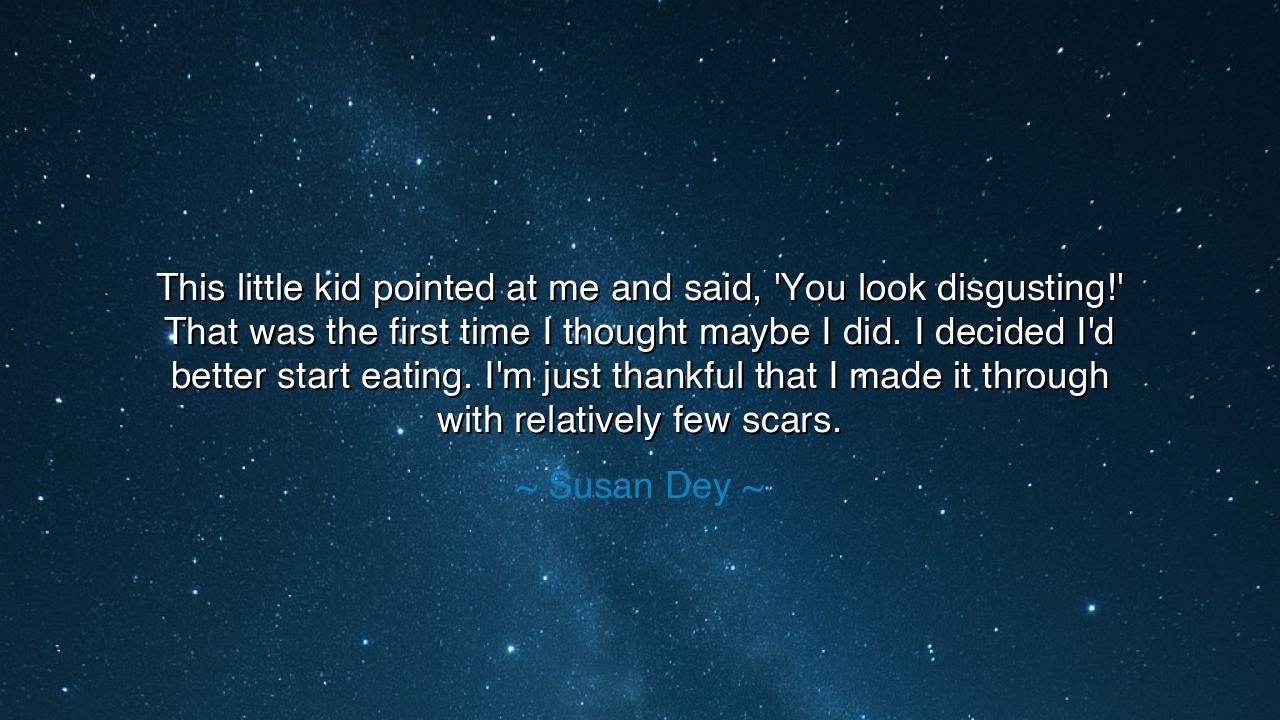
This little kid pointed at me and said, 'You look disgusting!'
This little kid pointed at me and said, 'You look disgusting!' That was the first time I thought maybe I did. I decided I'd better start eating. I'm just thankful that I made it through with relatively few scars.






When Susan Dey declares, “This little kid pointed at me and said, ‘You look disgusting!’ That was the first time I thought maybe I did. I decided I’d better start eating. I’m just thankful that I made it through with relatively few scars,” she speaks with the raw honesty of one who has wrestled with the shadows of self-perception and come through the fire scarred but not destroyed. Her words are both confession and testimony. They remind us of the fragility of human identity, how easily it may be shaken by the careless words of others, and yet how powerful gratitude can be when survival is claimed after struggle.
The origin of this reflection lies in the cruel power of body image, particularly for those in the public eye. Dey, beloved by millions as a young actress, carried the heavy burden of being constantly watched, judged, and measured against impossible standards. The words of a child—innocent, unfiltered, and brutally direct—pierced her more deeply than the whispers of critics. In that moment, she saw herself not through her own eyes but through the distorted reflection of another. Yet rather than remain in despair, she chose a path toward healing. Her thankfulness now comes not from denial of the pain, but from the triumph of endurance.
This truth finds echo in the story of Eleanor Roosevelt, who as a child was called “the ugly duckling” and grew up with deep insecurities about her appearance. Yet she rose to become one of the most admired women of her age, declaring that “no one can make you feel inferior without your consent.” Like Dey, she bore wounds inflicted by words, yet she used them as a forge, transforming suffering into strength. Both women remind us that scars do not define us—they are reminders that we survived.
There is also great humility in Dey’s reflection. She does not claim that she emerged untouched or that her journey was heroic in the grand sense. Instead, she speaks of surviving with “relatively few scars,” acknowledging that wounds remain, but refusing to be consumed by them. This humility is itself an act of courage, for many prefer to hide their struggles, yet she reveals them so others may learn. In her vulnerability, she offers strength to those still caught in the web of self-doubt and harmful self-image.
Her thankfulness is not shallow gratitude—it is survival gratitude. To say, “I made it through,” is to recognize that many do not. Eating disorders, self-loathing, and broken self-image have claimed countless lives. Dey honors her survival by speaking openly, not boasting in perfection but in endurance. Here lies a wisdom for the ages: survival itself is victory, and gratitude is the crown that adorns those who refuse to be defeated.
The lesson for us is profound: words have power. A single careless remark can wound deeply, especially in tender hearts. Yet even in such wounds, there lies the possibility of healing, if one can choose life over despair. Gratitude for survival is not weakness but strength. We must learn, like Dey, to give thanks not for the absence of hardship, but for the courage to endure it and emerge with dignity.
Practical wisdom follows. Guard your words, for they may cut deeper than you imagine. Speak life rather than judgment, encouragement rather than criticism. And in your own life, when hurt by the words of others, remember that your worth is not measured by their gaze. Like Susan Dey, choose to live, to nourish yourself, to seek healing. And when you come through your trial, count your scars not as shame, but as proof of survival, and give thanks.
Thus, in the words of Susan Dey, we are reminded of the enduring power of survival and gratitude. To be called “disgusting” and yet to stand years later and declare, “I am thankful I made it through,” is an act of defiance against despair. Let us then live with this courage, giving thanks not for perfect journeys, but for the strength to endure, and passing this wisdom on to those still struggling to see their own worth.






AAdministratorAdministrator
Welcome, honored guests. Please leave a comment, we will respond soon